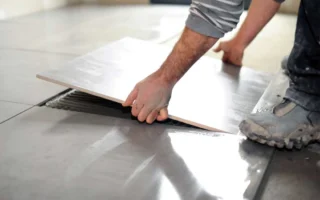If your cat is suddenly pooping on the floor, it can be frustrating and concerning. Remember that there are common reasons for changes in their bathroom habits, such as behavioural issues like stress or health problems like urinary tract infections. Changes in the environment or routine can also trigger this behaviour.
To help your cat use the litter box again, address potential stressors, keep it clean, provide mental and physical stimulation, and consult a veterinarian if necessary.
By being proactive and understanding possible causes of this behaviour change, you can work towards creating a solution that benefits both you and your feline friend.
The common reasons for sudden changes in a cat’s bathroom habits

Cats are creatures of habit, so any sudden change in their bathroom behaviour could signal an underlying issue. One common reason for this shift is behavioural problems. Cats can be sensitive to stress, anxiety, or even boredom, leading them to act out in unusual ways, like pooping outside the litter box.
Health problems are another factor to consider when your cat leaves surprises on the floor. Urinary tract infections, digestive issues, or other medical conditions might be causing discomfort and affecting their bathroom habits.
Changes in the environment or routine can also throw off your cat’s toilet etiquette. Whether it’s a new pet joining the family, rearranging furniture, or switching up their usual food – these alterations can disrupt your cat’s sense of security and comfort.
Understanding these potential triggers is crucial in addressing your cat’s sudden poop problem effectively. By identifying the cause of their behaviour change, you can help them feel more at ease and return to using that litter box like a pro!
Behavioural issues: stress, anxiety and boredom
Have you noticed your feline friend suddenly opting for the floor instead of their litter box? It could be due to underlying behavioural issues. Cats are sensitive creatures, and changes in their environment can trigger stress, anxiety, or boredom. Maybe there have been recent disruptions at home – a new pet, a change in routine, or even loud noises that are causing your cat distress.
Stress and anxiety can manifest in various ways in cats, including inappropriate elimination. To help alleviate these feelings, create a calm and predictable environment for your furry companion. Give them plenty of mental stimulation through interactive toys or designated playtime sessions.
If boredom is the culprit behind your cat’s newfound bathroom habits, consider enriching their environment with scratching posts, cosy hiding spots, or puzzle feeders. Keeping them mentally engaged can prevent them from seeking out alternative places to relieve themselves.
Addressing behavioural issues takes time and patience. By understanding what might be causing your cat’s behaviour changes, you can work towards creating a harmonious living space for both you and your beloved pet.

Health problems: urinary tract infections, digestive issues
Health problems can be a culprit when your cat starts pooping outside the litter box. Urinary tract infections are common in cats and can cause discomfort, leading them to avoid using their usual spot for elimination. Look for signs like straining, frequent trips to the litter box, or blood in their urine.
Digestive issues can also prompt this change in behaviour. Diarrhea or constipation may make it difficult for your cat to reach the litter box in time or associate pain with using it. Ensure your feline friend’s diet suits their digestive system, and consult your vet if you notice any irregularities.
Health problems should never be ignored regarding changes in bathroom habits. Addressing these issues promptly is essential to ensure your cat’s well-being and comfort.
Changes in the environment or routine
When your cat starts pooping on the floor out of the blue, it can be frustrating and confusing. One possible reason for this sudden behaviour change could be related to environmental or routine changes. Cats are creatures of habit, so even minor adjustments can throw them off.
Moving to a new home, rearranging furniture, introducing a new pet, or changing their litter box type or location can all disrupt your cat’s sense of security and comfort. Cats rely heavily on familiarity and consistency in their surroundings.
To help your feline friend adjust better to environmental changes, maintain a stable routine as much as possible. Provide hiding spots, scratching posts, and perches to create a safe space where they feel secure.
Solutions to help your cat use the litter box again
Has your furry feline friend decided the floor is their new bathroom spot? Don’t worry; there are ways to help them get back on track, such as using the litter box. First, ensure you have enough litter boxes in your home – ideally, one per cat plus an extra one. Cats can be picky about sharing!
Next, keep those litter boxes clean and inviting by scooping them at least once daily and changing the litter regularly. Some cats are sensitive to certain types of litter or scents, so experiment with different options to see what your kitty prefers.
If stress or anxiety seems to be the culprit behind their behaviour change, try creating a calm environment for your cat by providing hiding spots, vertical spaces to climb on, and interactive toys for mental stimulation.
When to consult a veterinarian
If your cat is constantly pooping outside the litter box and you’ve tried various solutions without success, it’s time to seek professional help. Veterinarians are trained to identify underlying health issues that may be causing your cat’s sudden change in behaviour.
A vet visit is crucial if you notice blood in your cat’s stool, significant changes in their bathroom habits, or if they seem to be in discomfort when using the litter box. Cats are masters at hiding pain or illness, so any unusual behaviour should be taken seriously.
Don’t wait too long before scheduling an appointment with your vet. Early detection of health problems can lead to better outcomes for your feline friend. A veterinarian will conduct a thorough examination and may recommend further tests to pinpoint the root cause of the issue.
Seeking professional advice sooner rather than later can make a world of difference for both you and your beloved pet.




